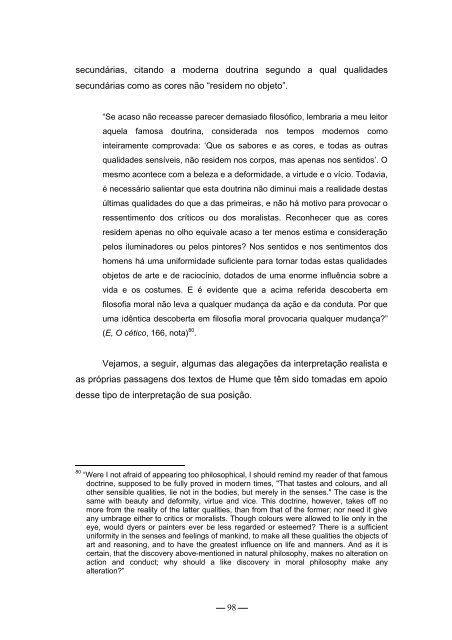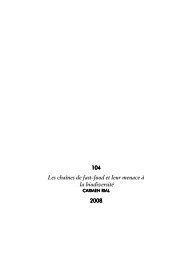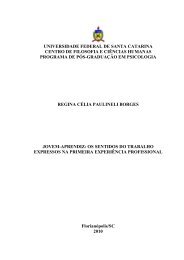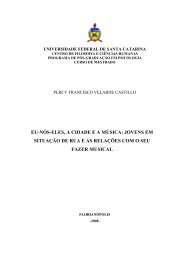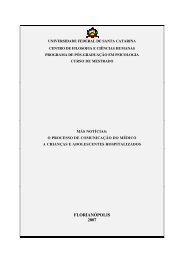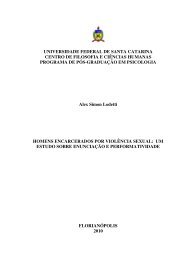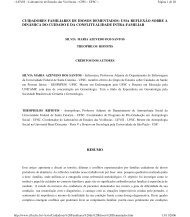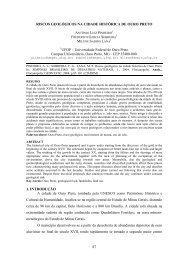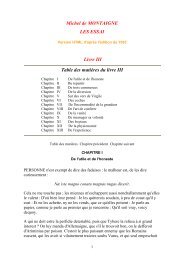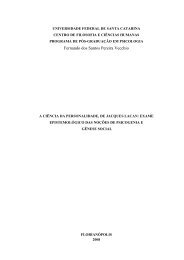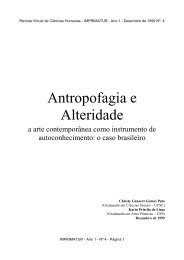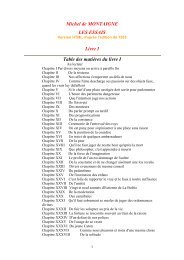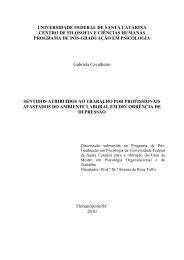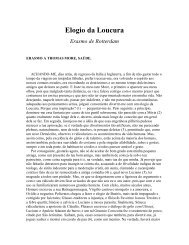A natureza da moral de Hume - CFH
A natureza da moral de Hume - CFH
A natureza da moral de Hume - CFH
Create successful ePaper yourself
Turn your PDF publications into a flip-book with our unique Google optimized e-Paper software.
secundárias, citando a mo<strong>de</strong>rna doutrina segundo a qual quali<strong>da</strong><strong>de</strong>s<br />
secundárias como as cores não “resi<strong>de</strong>m no objeto”.<br />
“Se acaso não receasse parecer <strong>de</strong>masiado filosófico, lembraria a meu leitor<br />
aquela famosa doutrina, consi<strong>de</strong>ra<strong>da</strong> nos tempos mo<strong>de</strong>rnos como<br />
inteiramente comprova<strong>da</strong>: ‘Que os sabores e as cores, e to<strong>da</strong>s as outras<br />
quali<strong>da</strong><strong>de</strong>s sensíveis, não resi<strong>de</strong>m nos corpos, mas apenas nos sentidos’. O<br />
mesmo acontece com a beleza e a <strong>de</strong>formi<strong>da</strong><strong>de</strong>, a virtu<strong>de</strong> e o vício. To<strong>da</strong>via,<br />
é necessário salientar que esta doutrina não diminui mais a reali<strong>da</strong><strong>de</strong> <strong>de</strong>stas<br />
últimas quali<strong>da</strong><strong>de</strong>s do que a <strong>da</strong>s primeiras, e não há motivo para provocar o<br />
ressentimento dos críticos ou dos <strong>moral</strong>istas. Reconhecer que as cores<br />
resi<strong>de</strong>m apenas no olho equivale acaso a ter menos estima e consi<strong>de</strong>ração<br />
pelos iluminadores ou pelos pintores? Nos sentidos e nos sentimentos dos<br />
homens há uma uniformi<strong>da</strong><strong>de</strong> suficiente para tornar to<strong>da</strong>s estas quali<strong>da</strong><strong>de</strong>s<br />
objetos <strong>de</strong> arte e <strong>de</strong> raciocínio, dotados <strong>de</strong> uma enorme influência sobre a<br />
vi<strong>da</strong> e os costumes. E é evi<strong>de</strong>nte que a acima referi<strong>da</strong> <strong>de</strong>scoberta em<br />
filosofia <strong>moral</strong> não leva a qualquer mu<strong>da</strong>nça <strong>da</strong> ação e <strong>da</strong> conduta. Por que<br />
uma idêntica <strong>de</strong>scoberta em filosofia <strong>moral</strong> provocaria qualquer mu<strong>da</strong>nça?”<br />
(E, O cético, 166, nota) 80 .<br />
Vejamos, a seguir, algumas <strong>da</strong>s alegações <strong>da</strong> interpretação realista e<br />
as próprias passagens dos textos <strong>de</strong> <strong>Hume</strong> que têm sido toma<strong>da</strong>s em apoio<br />
<strong>de</strong>sse tipo <strong>de</strong> interpretação <strong>de</strong> sua posição.<br />
80 “Were I not afraid of appearing too philosophical, I should remind my rea<strong>de</strong>r of that famous<br />
doctrine, supposed to be fully proved in mo<strong>de</strong>rn times, "That tastes and colours, and all<br />
other sensible qualities, lie not in the bodies, but merely in the senses." The case is the<br />
same with beauty and <strong>de</strong>formity, virtue and vice. This doctrine, however, takes off no<br />
more from the reality of the latter qualities, than from that of the former; nor need it give<br />
any umbrage either to critics or <strong>moral</strong>ists. Though colours were allowed to lie only in the<br />
eye, would dyers or painters ever be less regar<strong>de</strong>d or esteemed? There is a sufficient<br />
uniformity in the senses and feelings of mankind, to make all these qualities the objects of<br />
art and reasoning, and to have the greatest influence on life and manners. And as it is<br />
certain, that the discovery above-mentioned in natural philosophy, makes no alteration on<br />
action and conduct; why should a like discovery in <strong>moral</strong> philosophy make any<br />
alteration?”<br />
⎯ 98 ⎯


